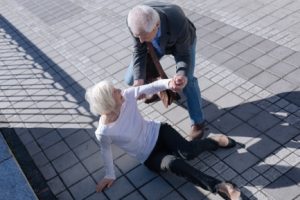
This evidence-based course will focus on the assessment and treatment of patients with vertigo and dysequalibrium from unusual vestibular causes.

This evidence-based course will focus on the assessment and treatment of patients with vertigo and dysequalibrium from unusual vestibular causes.
This evidence-based course will focus on the assessment and treatment of patients with vertigo and dysequalibrium from unusual vestibular causes. Course participants will distinguish among causes of dizziness such as Concussion, Chronic Subjective Dizziness (Persistent Postural Perceptual Dizziness), Anxiety, Superior Canal Dehiscence, Fistula, Migraine, and Meniere’s disease. Course participants will be able to design and modify treatment programs based on the nature of the cause of dizziness in this patient population.
Upon completion of this course, participants will be able to:
1. Discuss the pathophysiology of concussion and the common symptoms associated with concussion.
2. Describe the characteristics of Physiologic Post-Concussion Disorder, Vestibulo-ocular Post-Concussion Disorder, and Cervicogenic Post-Concussion Disorder.
3. Describe the parameters of the Buffalo Concussion Treadmill Test and the aerobic exercise program based on the treadmill test results.
4. Design a treatment regimen for patients with Vestibulo-ocular PCD, and Cervicogenic PCD.
5. Identify the criteria for diagnosis of Migraine Associated Dizziness.
6. Identify Chronic Subjective Dizziness (Persistent Postural Perceptual Dizziness) and describe the three arms of treatment for CSD.
7. Discuss the physiologic and imaging test results in patients with CSD.
Richard Clendaniel, PT, PhD, FAPTA is an assistant professor in the Department of Orthopedic Surgery, Doctor of Physical Therapy Division, and in the Department of Head & Neck Surgery and Communication Sciences at the Duke University School of Medicine. He received his MS in Physical Therapy and Ph.D. in Behavioral Neuroscience from the University of Alabama at Birmingham and completed a post-doctoral fellowship in neuro-otology with Susan Herdman, PhD, PT. He previously served as director of the Vestibular Rehabilitation program at Johns Hopkins University School of Medicine, Department of Otolaryngology - Head and Neck Surgery. He is on the medical advisory board for the Vestibular Disorders Association (VEDA) and on the board of directors for the American Balance Society. Dr. Clendaniel maintains an active practice treating patients with vestibular disorders and dizziness. His research is in the assessment of the vestibular system and the plasticity of the vestibular system following injury.
Financial Disclosure: Richard Clendaniel receives an honorarium from Education Resources, Inc. and royalties as a book editor for V̲e̲s̲t̲i̲b̲u̲l̲a̲r̲ ̲R̲e̲h̲a̲b̲i̲l̲i̲t̲a̲t̲i̲o̲n̲, 4th edition, Herdman & Clendaniel.
Non-Financial Disclosure: Richard Clendaniel has no relevant non-financial relationships to disclose.
Once you purchase an online course you will have access to the course materials. If you have purchased this course, please ensure you have logged in to your account in order to take the exam.
Once you purchase an online course, you will have the opportunity to take an exam to test your retention of the material. If you have purchased this course, please ensure you have logged in to your account in order to take the exam. The exam must be completed with a pass rate of 80% or more in order to receive your certificate of attendance.

Continuing Education Hours for disciplines not listed below: 3 Contact Hours (.3 CEUs). Intermediate Level.
Approved for FL Occupational Therapists for 3.6 continuing education hours - CE Broker # 20-503154.
Approved by the KY Physical Therapy Association for 3 contact hours. Approval #CS64-2010-KPTA thru 3/6/21.
Approved by the MD Board of Physical Therapy Examiners for .3 CEUs.
Approved by the NM Physical Therapy Board for 3 CE Hours.
Approved by OK State Board of PT course #___ for 3 CEUs, Category B.
Education Resources is an approved agency by the PT Board of CA for 3 contact hours. Approved sponsor by the State of IL Department of Financial and Professional Regulation for Physical Therapy for 3.5 contact hours.
Approved provider by the NY State Board of Physical Therapy for 3.6 contact hours (.36 CEUs).
This continuing competence activity has been approved by the NC Physical Therapy Association #19-0722-021. This activity is provided by the TX Board of PT Examiners accredited provider #1910017TX for 3 CCUs and meets continuing competence requirements for PTs and PTAs licensure renewal in TX. Participant's License Number _________.
This session applies 3 contact hours (0.3 CEUs) toward approval by the MN Board of PT Examiners, the NV State Board of PT Examiners and NJ State Board of PT Examiners but therapists must take the full series to receive CEUs and approval number.
The following state boards of physical therapy accept other states’ approval: AK, AR, AZ, DC, DE, GA, HI, ID, IN, KS, MI, MO, MS, OR, PA, RI, SC, UT, VA, VT, WI, WY. The following state boards of physical therapy either do not require course pre-approval or do not require CEUs for re-licensure: AL, CO, CT, IA, MA, ME, MT, NE, ND, NH, SD, WA.
Education Resources is an AOTA Approved Provider for Live and Distance Learning-Independent Courses for 3 Contact Hours (.3 CEUs).
NBCOT Professional Development for 3.75 PDUs.
Education Resources Inc. 266 Main Street, Medfield Ma 02052 800-487-6530